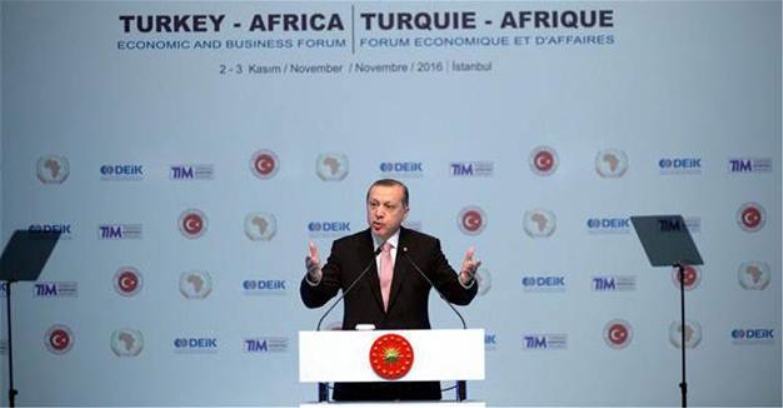
TURKEY-AFRICA COOPERATION – The Turkey-Africa Economic and Business Forum, which concluded yesterday in Istanbul, has highlighted Turkey’s strategy to improve bilateral trade and economic relations with African countries, particularly those in sub-Saharan Africa.
The Forum, jointly organized by Ministry of Economy of the Republic of Turkey, the African Union Commission, Foreign Economic Relations Board (DEİK) and the Turkish Exporters Assembly (TİM), has offered to leaders of African industry and the most important Turkish businessmen to develop B2B (business-to-business) meetings.
Overall, the two days’ work have created new business opportunity for both sides and consolidated Turkish-African cooperation, which in recent years has increasingly intensified, as is shown by data released on the eve of the Forum by the Turkish Statistical Institute.
According to TurkStat, Turkey’s exports to Africa in the last five years have tripled compared to its worldwide export volume. Specifically, increased by 20.5 percent between 2011 and 2015, while Turkey’s overall export volume to the whole world rose by only 7 percent. In the same period, Turkey’s foreign trade volume with Africa totaled $93.8 billion.
Exports to African countries soared to $12.5 billion in 2015 from $10.33 billion in 2011, while imports from the continent decreased by 25 percent to reach almost $5 billion within the same period.
In addition, according to the Turkish Ministry of Culture and Tourism, the number of African tourists visiting Turkey almost doubled, reaching 885,900 in 2015 from 445,500 in 2011. Lastly, another survey shows that Turkish contractors have completed 1,202 projects worth $58 billion since 1972.
Eloquent numbers that highlight not only an increase in quantity, but also qualitative in trade relations between the two blocs.
However, it should be noted that until now Turkish investors have clearly favoured the North African countries, but are now focusing their attention on sub-Saharan Africa.
This is an interest that places the energy sector at the forefront. Turkish companies have acquired considerable experience in this sector, which can help the sub-Saharan area, where 620 million people lack access to electricity, to fill this structural gap.
The activism of the Turkish government towards the African continent is not limited to business, but also to the development of an institutional firm link with the various African governments. The increase of the relations between the two geographical areas has been marked since the Africa Action Plan, which was launched in 1998 by the World Bank. Since then, thanks to historical and cultural ties that date back to the Ottoman period, Turkey has turned its gaze to Africa, adopting a targeted policy.
The current AKP administration, whose foreign policy architect was Ahmet Davutoğlu, has relaunched a vigourous dialogue with the African continent, as well as with all other “neighbours” sharing a common heritage. The discovery and exploitation of the shared past has been the engine of diplomacy in Ankara, but this diplomacy is also driven by a strong business-oriented approach.
The creation / strengthening of economic interdependence, which builds on shared values and memories for Ankara, has become functional to the maintenance of peaceful relations. This has constituted a new element in the approach of Turkey’s foreign policy, confined until the advent of the AKP to a substantial international isolation. Not surprisingly for a long time, the motto was valid, “the only friend of a Turk is a Turk”.
In its African policy, Turkey has mainly focused its attention on Somalia, where it is active in several areas and projects ranging from the creation of infrastructure, humanitarian, health and safety programs. Turkish investment there is remarkable. Just look at the wide range of interventions and support missions of TIKA (Turkish Agency for Development and Cooperation) and the number of orders for private stakeholders.
Turkey’s relations with Somalia are very extensive, as evidenced by the fact that in August 2011, Erdogan was the first non-African leader to visit the Horn of Africa country in the last two decades. Moreover, to find a solution to the Somali crisis, in May 2010 and in June 2012 Turkey hosted two international conferences in Istanbul.
Ultimately, Ankara’s choice to install a military base in Somalia reveals the geostrategic importance that this country in the Horn of Africa, located near the Gulf of Aden, plays for Turkey.
Given the political and economic interests, the safety of the country and the containment of terrorist threats are priorities for Ankara and fall within the logic of “humanitarian diplomacy” promoted by the AKP.
The Somali experience is an example of how Ankara is using all the tools of soft power at its disposal to increase its influence on the continent; and also to reach the goal to become one of the top 10 largest economies in the world by 2023, to coincide with the centenary of the Republic of Turkey.
TURKEY-AFRICA COOPERATION – The Turkey-Africa Economic and Business Forum, which concluded yesterday in Istanbul, has highlighted Turkey’s strategy to improve bilateral trade and economic relations with African countries, particularly those in sub-Saharan Africa.






